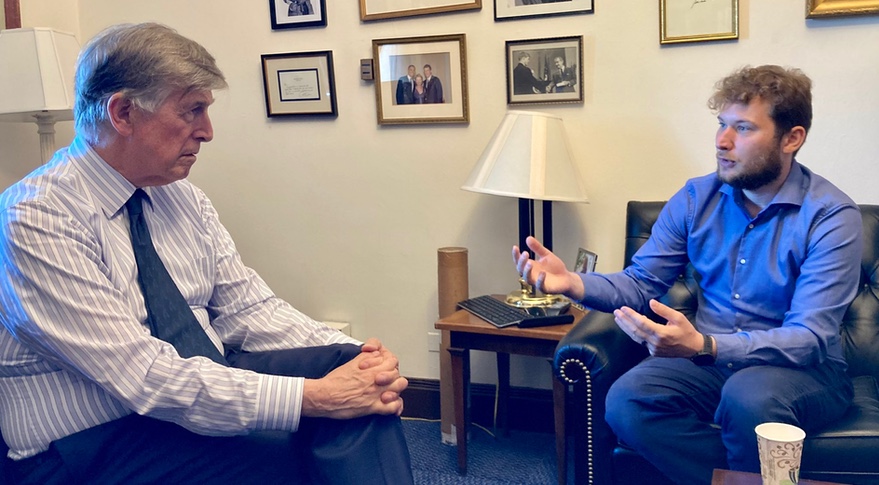WASHINGTON — A member of the European Parliament is touring the United States to help enhance space policy relationships while also promoting an effort to develop a European space law.
Niklas Nienass, a member of the European Parliament from Germany, met with officials in Washington this week, including at NASA, NOAA and the White House, before going on to Denver and Houston, stops that included meeting with Sen. John Hickenlooper (D-Colo.), who chairs the space subcommittee of the Senate Commerce Committee, and touring the Johnson Space Center.
“The very first task is to build up good relations and have somebody to talk to” as the European Union enhances its profile in space policy, he said in an interview. While there is close cooperation on space topics between American and European agencies, such as between NASA and the European Space Agency, he argued it’s lacking at a higher level between the U.S. and the E.U. “If you look at the political level, there’s just not so much in terms of coordination and working together.”
Part of that, he said, is because of the multitude of European players, such as ESA and national space agencies as well as the European Commission. “We definitely have to work on that so we have one coherent strategy in which all these things can go.”
Closer cooperation between the European Union and the United States, he said, is needed for topics like space traffic management and utilization of space resources. He said American efforts like the Artemis Accords, which several E.U. nations have signed, aren’t sufficient to address those issues. He has previously criticized the provision of the Artemis Accords supporting resource utilization, arguing instead for the Moon Agreement that he says could offer a more equitable distribution of resources.
“It doesn’t necessarily have to be the Moon Treaty,” he said. “But I think there has to be a more comprehensive text that brings together multiple stakeholders, whereas the Artemis Accords are not even a treaty.”
Such an international agreement, he said, could cover issues like space traffic management and space resources. “There are a lot of points where I think we could go further in international relations and where we need an update anyway, because the Outer Space treaty is not sufficient enough,” he said. “The Artemis Accords are just not fitting to solve the problem.”
Nienass is also working to strengthen space policy within Europe. He is a leading advocate for an overarching European space law to cover various issues that have traditionally been handled by a patchwork of national space laws among E.U. members. That will make it easier, he argued, for European companies to work across national borders. “I want to have this harmonized so that they can easily work together.”
Among the provisions of the proposed legislation include liabilities and registrations that are handled at a national level today. The legislation would address support for European space industry, including both startups and larger companies. Space sustainability will be another topic, such as requiring satellites to deorbit at the end of their lives.
“I think it would set a really strong precedent for international legislation to show what is possible,” he said, adding that by giving firm guidance to Europe’s space industry “they will really accelerate.”
Work on the space law, he said, is still in its earliest stages. One challenge for the bill, he said, is that the treaty outlining the European Union’s responsibilities states that there is no harmonization required for space and other research activities among members, but for commerce harmonization is required. “Now that space is going from research toward more private, commercial activity, the European Commission is wondering which direction should it go.”
Nienass said the European Parliament will take up a resolution next week that will call for a European space law. However, commissioners will then have to propose a law for the parliament to consider. “I want to go forward and make them do that for the next two years,” he said, because his mandate in parliament ends in 2024.
There is strong support for a European space law, he said, particularly among companies who support harmonization of national space laws. “Everybody agrees that it’s a good direction to go, but everybody’s skeptical whether we are allowed to do it.”
